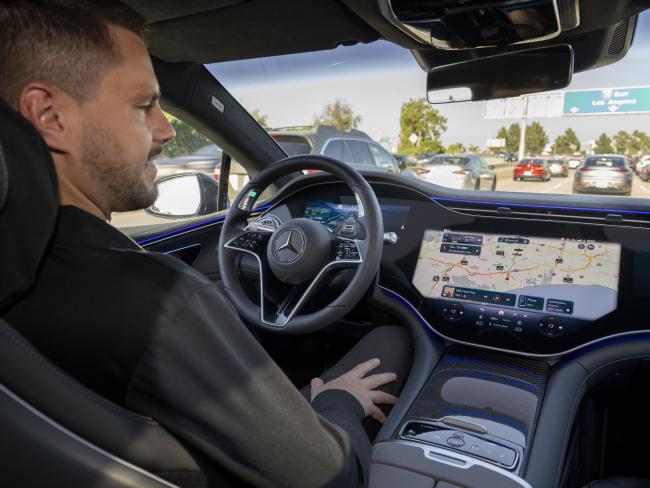27 December 2023

Mercedes-Benz has taken another step towards a fully autonomous vehicle with its Drive Pilot system, but there’s still a long way to go. Photo Automotive Rhythms via Flickr (CC BY-NC-ND 2.0).
The government’s investment strategy now favours road over rail. This change is illustrated by its decision to delay creating Great British Railways (GBR); instead it will prioritise autonomous car legislation.
The railway timetable fiasco of 2018 highlighted the need for the fragmented and privatised railway to have a “single guiding mind”. The Williams-Shapps Plan for Rail published in May 2021 called for GBR to be created to fulfil that role.
No progress
Around £50 million has been spent on a Transition Team to prepare the ground for GBR. Yet five years on, there is still no progress towards that single guiding mind.
Meanwhile work on Britain’s most expensive current road project has begun, upgrading the A428 between Milton Keynes and Cambridge. National Highways estimates that the new ten mile road will save drivers up to ten minutes during peak times when it opens in 2027, at a cost of £100 million a mile.
In 2019, during the planning phase, the government said that the A428 improvements would save drivers “up to 90 minutes”!
Promises
Transport Secretary Mark Harper has promised to spend over £25 billion on roads – 70 per cent of the savings from the cancellation of HS2 north of Birmingham. And a large part of that will be in London.
At least some of those new roads are needed – and many repairs are certainly needed. But it is also inevitable that even more roads will become necessary without modern public transport alternatives.
Benefits case
Harper and previous transport ministers have trumpeted the supposed economic benefits of autonomous vehicles, often linked to net zero targets. In reality, the benefits case depends on the promise of a significant reduction in accidents, extrapolated from limited small-scale trials.
On 26 December Harper told BBC Radio 4’s Today programme that he hoped legislation would be passed by the end of 2024. He said, “Probably by as early as 2026 people will start seeing some elements of these cars that have full self driving capabilities being rolled out.” That’s a year earlier than previously announced, pleasing the companies promoting autonomous cars.
Reality
In reality, vehicle automation is a decades-long development process, which requires far more than passing a law. Mercedes-Benz is the first manufacturer to introduce Level 3 conditional automation, in Europe in 2022 and in the US in 2023.
The new feature, called Drive Pilot, enables a car to travel without the driver having hands on the wheel or eyes on the road, but able to take control within a few seconds. But it works only in certain limited conditions – daylight, good weather, visible road markings, low speeds and a car in front on roads GPS-mapped by Mercedes. It’s a long way short of full automation at Level 5.
Sceptical
Outside of the government and manufacturers, people are still sceptical about the promises of autonomous vehicles and whether their development should be a priority. A survey published in July 2023 found that respondents from both rural and urban areas thought their ideal transport system should include better public transport. People thought that safety should be central to autonomous vehicle design and introduction.
